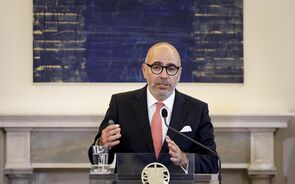Europa - Crescimento
1 Mensagem
|Página 1 de 1
Europa - Crescimento
European Growth Rises to Fastest Pace in Three Years (Update1)
May 14 (Bloomberg) -- Economic growth in the dozen euro nations accelerated to the fastest pace in three years in the first quarter as exporters benefited from burgeoning demand in the U.S. and Asia.
The economy expanded 0.6 percent in the first three months, faster than the 0.5 percent median forecast of 32 economists in a Bloomberg News survey, Luxembourg-based Eurostat said. Growth picked up from 0.4 percent in the final quarter of 2003.
Demand from abroad is helping the $8.5 trillion economy recover from the slowest growth in a decade last year. Companies including Linde, Europe's second-largest maker of forklifts, and Amsterdam-based Royal Philips Electronics NV have boosted sales abroad. Exports in Germany, Europe's largest economy, rose almost twice as fast as imports in the first quarter.
Growth is ``primarily coming from the export sector,'' said James Knightley, an economist at ING Bank NV in London. ``Domestic demand still remains weak. The pickup we are seeing is primarily driven by what we see in the U.S., U.K. and China.''
Deutsche Telekom AG, Europe's biggest phone company, said growth in the U.S. drove an increase in earnings at its wireless division.
Eurostat's initial estimate of gross domestic product, the value of all goods and services, is adjusted for seasonal factors and inflation and didn't include a breakdown by spending category. Fuller figures will be published on June 1. Eurostat revised fourth-quarter growth from 0.3 percent.
Euro's Drop
The 8 percent decline in the euro from a record against the dollar on Feb. 18 has brightened the outlook for European exporters. The euro dropped for a second day against the U.S. currency today, falling 0.2 percent to $1.1804 at 11:02 a.m.
The European Commission left its forecast for the second quarter unchanged, saying growth will range between 0.3 percent and 0.7 percent. The expansion will accelerate to 0.4 percent to 0.8 percent in the third quarter, the Brussels-based commission said, citing ``some improvement in the underlying data.''
Stagnating household demand has kept Europe on a slower growth track than the U.S. and Japan. The U.S., the world's largest economy and destination of a fifth of Europe's exports, expanded 1 percent in the first quarter on a comparable basis, and grew at an annualized rate of 4.2 percent.
``If the rest of the world carries on bobbing along, then Europe will keep trundling along behind,'' said Charles Dumas, director of Lombard Street Research Ltd. in London.
France in the Lead
Germany expanded 0.4 percent in the first quarter, the same pace as Italy and the Netherlands. France, the only country to report strengthening consumer demand in the period, grew 0.8 percent.
Rising unemployment and concern about welfare cuts have led to a decline in German household spending for the past three quarters. In Italy, the collapse of Parmalat Finanzaria SpA, the nation's biggest dairy, and strikes at automaker Fiat SpA have helped keep household confidence near a 10-year low.
In France, consumer spending on manufactured goods rose 2 percent in the first quarter, more than double the pace in the previous three months. LVMH Louis Vuitton SA, the world's biggest luxury goods company, had its first sales gain in five quarters in the first three months.
The Organization for Economic Cooperation and Development predicts growth of 2 percent for France this year, almost double the 1.1 percent it forecasts for Germany and 0.9 percent for Italy. The OECD expects the U.S. economy to grow 4.7 percent.
Rates on Hold
French growth is ``very encouraging, better than almost everybody had expected,'' European Central Bank Chief Economist Otmar Issing said Wednesday.
The European growth reports support the ECB's view that the economy is on course for a ``gradual'' recovery, and economists including Gavin Redknap of Standard Chartered Plc say it makes it less likely that policy makers will lower borrowing costs.
The bank has left interest rates unchanged at 2 percent since June, rejecting calls for a cut from government leaders including German Chancellor Gerhard Schroeder. Some companies are still banking on the ECB to help Europe catch up with the rest of the world.
``North America has picked up, Europe is the weakest,'' said Julien De Wilde, chief executive officer of Bekaert NV, the world's biggest maker of steel cord for tires. ``I think they need to do something about it.'' Lower interest rates ``would help. It would increase consumption.''
One risk to growth is that rising oil prices may reduce company profits and ramp up inflation, which was at the ECB's 2 percent limit in April. Crude-oil futures traded near a record high today. The benchmark contract rose as high as $41.17 a barrel in after-hours trading, beating the $41.15 high on Oct. 10, 1990, after Saddam Hussein's troops occupied Kuwait.
May 14 (Bloomberg) -- Economic growth in the dozen euro nations accelerated to the fastest pace in three years in the first quarter as exporters benefited from burgeoning demand in the U.S. and Asia.
The economy expanded 0.6 percent in the first three months, faster than the 0.5 percent median forecast of 32 economists in a Bloomberg News survey, Luxembourg-based Eurostat said. Growth picked up from 0.4 percent in the final quarter of 2003.
Demand from abroad is helping the $8.5 trillion economy recover from the slowest growth in a decade last year. Companies including Linde, Europe's second-largest maker of forklifts, and Amsterdam-based Royal Philips Electronics NV have boosted sales abroad. Exports in Germany, Europe's largest economy, rose almost twice as fast as imports in the first quarter.
Growth is ``primarily coming from the export sector,'' said James Knightley, an economist at ING Bank NV in London. ``Domestic demand still remains weak. The pickup we are seeing is primarily driven by what we see in the U.S., U.K. and China.''
Deutsche Telekom AG, Europe's biggest phone company, said growth in the U.S. drove an increase in earnings at its wireless division.
Eurostat's initial estimate of gross domestic product, the value of all goods and services, is adjusted for seasonal factors and inflation and didn't include a breakdown by spending category. Fuller figures will be published on June 1. Eurostat revised fourth-quarter growth from 0.3 percent.
Euro's Drop
The 8 percent decline in the euro from a record against the dollar on Feb. 18 has brightened the outlook for European exporters. The euro dropped for a second day against the U.S. currency today, falling 0.2 percent to $1.1804 at 11:02 a.m.
The European Commission left its forecast for the second quarter unchanged, saying growth will range between 0.3 percent and 0.7 percent. The expansion will accelerate to 0.4 percent to 0.8 percent in the third quarter, the Brussels-based commission said, citing ``some improvement in the underlying data.''
Stagnating household demand has kept Europe on a slower growth track than the U.S. and Japan. The U.S., the world's largest economy and destination of a fifth of Europe's exports, expanded 1 percent in the first quarter on a comparable basis, and grew at an annualized rate of 4.2 percent.
``If the rest of the world carries on bobbing along, then Europe will keep trundling along behind,'' said Charles Dumas, director of Lombard Street Research Ltd. in London.
France in the Lead
Germany expanded 0.4 percent in the first quarter, the same pace as Italy and the Netherlands. France, the only country to report strengthening consumer demand in the period, grew 0.8 percent.
Rising unemployment and concern about welfare cuts have led to a decline in German household spending for the past three quarters. In Italy, the collapse of Parmalat Finanzaria SpA, the nation's biggest dairy, and strikes at automaker Fiat SpA have helped keep household confidence near a 10-year low.
In France, consumer spending on manufactured goods rose 2 percent in the first quarter, more than double the pace in the previous three months. LVMH Louis Vuitton SA, the world's biggest luxury goods company, had its first sales gain in five quarters in the first three months.
The Organization for Economic Cooperation and Development predicts growth of 2 percent for France this year, almost double the 1.1 percent it forecasts for Germany and 0.9 percent for Italy. The OECD expects the U.S. economy to grow 4.7 percent.
Rates on Hold
French growth is ``very encouraging, better than almost everybody had expected,'' European Central Bank Chief Economist Otmar Issing said Wednesday.
The European growth reports support the ECB's view that the economy is on course for a ``gradual'' recovery, and economists including Gavin Redknap of Standard Chartered Plc say it makes it less likely that policy makers will lower borrowing costs.
The bank has left interest rates unchanged at 2 percent since June, rejecting calls for a cut from government leaders including German Chancellor Gerhard Schroeder. Some companies are still banking on the ECB to help Europe catch up with the rest of the world.
``North America has picked up, Europe is the weakest,'' said Julien De Wilde, chief executive officer of Bekaert NV, the world's biggest maker of steel cord for tires. ``I think they need to do something about it.'' Lower interest rates ``would help. It would increase consumption.''
One risk to growth is that rising oil prices may reduce company profits and ramp up inflation, which was at the ECB's 2 percent limit in April. Crude-oil futures traded near a record high today. The benchmark contract rose as high as $41.17 a barrel in after-hours trading, beating the $41.15 high on Oct. 10, 1990, after Saddam Hussein's troops occupied Kuwait.
-
MSM
1 Mensagem
|Página 1 de 1
Quem está ligado:
Utilizadores a ver este Fórum: aaugustob69, Abade19, cali010201, CC-5, cftomas, darkreflection, Esquinas3, iniciado1, Investbem, karaya75, m-m, malakas, Manchini888, MarketGodzilla, maturidade, MR32, niceboy, nunorpsilva, O Magriço, Olhar Leonino, PAULOJOAO, PMP69, Shimazaki_2, STRESSZERO, TTM62 e 97 visitantes


